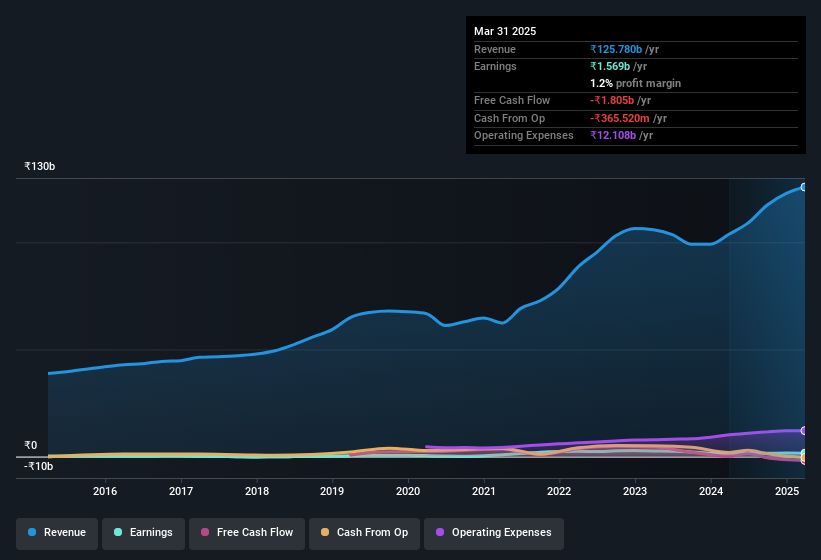PDS' (NSE:PDSL) Shareholders May Want To Dig Deeper Than Statutory Profit
The market shrugged off PDS Limited's (NSE:PDSL) solid earnings report. We think that investors might be worried about some concerning underlying factors.
We've discovered 1 warning sign about PDS. View them for free.
In order to understand the potential for per share returns, it is essential to consider how much a company is diluting shareholders. As it happens, PDS issued 7.0% more new shares over the last year. Therefore, each share now receives a smaller portion of profit. Per share metrics like EPS help us understand how much actual shareholders are benefitting from the company's profits, while the net income level gives us a better view of the company's absolute size. Check out PDS' historical EPS growth by clicking on this link.
A Look At The Impact Of PDS' Dilution On Its Earnings Per Share (EPS)
Unfortunately, PDS' profit is down 37% per year over three years. The good news is that profit was up 8.8% in the last twelve months. But EPS was less impressive, up only 4.1% in that time. Therefore, the dilution is having a noteworthy influence on shareholder returns.
In the long term, earnings per share growth should beget share price growth. So it will certainly be a positive for shareholders if PDS can grow EPS persistently. However, if its profit increases while its earnings per share stay flat (or even fall) then shareholders might not see much benefit. For the ordinary retail shareholder, EPS is a great measure to check your hypothetical "share" of the company's profit.
That might leave you wondering what analysts are forecasting in terms of future profitability. Luckily, you can click here to see an interactive graph depicting future profitability, based on their estimates.
Our Take On PDS' Profit Performance
PDS shareholders should keep in mind how many new shares it is issuing, because, dilution clearly has the power to severely impact shareholder returns. Therefore, it seems possible to us that PDS' true underlying earnings power is actually less than its statutory profit. The good news is that its earnings per share increased slightly in the last year. At the end of the day, it's essential to consider more than just the factors above, if you want to understand the company properly. If you want to do dive deeper into PDS, you'd also look into what risks it is currently facing. You'd be interested to know, that we found 1 warning sign for PDS and you'll want to know about it.
Today we've zoomed in on a single data point to better understand the nature of PDS' profit. But there is always more to discover if you are capable of focussing your mind on minutiae. For example, many people consider a high return on equity as an indication of favorable business economics, while others like to 'follow the money' and search out stocks that insiders are buying. So you may wish to see this free collection of companies boasting high return on equity, or this list of stocks with high insider ownership.
New: Manage All Your Stock Portfolios in One Place
We've created the ultimate portfolio companion for stock investors, and it's free.
• Connect an unlimited number of Portfolios and see your total in one currency
• Be alerted to new Warning Signs or Risks via email or mobile
• Track the Fair Value of your stocks
Have feedback on this article? Concerned about the content? Get in touch with us directly. Alternatively, email editorial-team (at) simplywallst.com.
This article by Simply Wall St is general in nature. We provide commentary based on historical data and analyst forecasts only using an unbiased methodology and our articles are not intended to be financial advice. It does not constitute a recommendation to buy or sell any stock, and does not take account of your objectives, or your financial situation. We aim to bring you long-term focused analysis driven by fundamental data. Note that our analysis may not factor in the latest price-sensitive company announcements or qualitative material. Simply Wall St has no position in any stocks mentioned.
About NSEI:PDSL
PDS
Together its subsidiaries, designs, develops, sources, manufactures, markets, and distributes various readymade garments and other consumer products worldwide.
Excellent balance sheet with reasonable growth potential.
Market Insights
Community Narratives


Recently Updated Narratives

Astor Enerji will surge with a fair value of $140.43 in the next 3 years

Proximus: The State-Backed Backup Plan with 7% Gross Yield and 15% Currency Upside.


A case for for IMPACT Silver Corp (TSXV:IPT) to reach USD $4.52 (CAD $6.16) in 2026 (23 bagger in 1 year) and USD $5.76 (CAD $7.89) by 2030
Popular Narratives


MicroVision will explode future revenue by 380.37% with a vision towards success


The company that turned a verb into a global necessity and basically runs the modern internet, digital ads, smartphones, maps, and AI.



